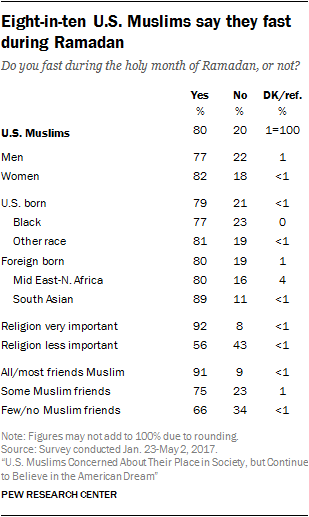Eid Mubarak to all who celebrate!
عيد مبارك لكل من يحتفل!
Recommended Videos
Eid al-Fitr is a two-day religious holiday that falls on May 1 and May 2 this year. The holiday marks the end of the Muslim community’s fasting during Ramadan.
This year, Ramadan started on April 1.

What is Ramadan?
Ramadan is a monthlong fast practiced by people of the Islamic faith. Typically, when someone is observing the holy month, they participate in fasting from sunrise to sundown. With this style of fasting, Muslims don’t eat or drink anything during the day, including water.
There are some exceptions to the rules. For instance, if a person gets sick during Ramadan, they are not expected to fast. However, on the days that they miss fasting, they are expected to make up those days when they are able. This rule applies to all who miss a day or more of their fasting.
Typically, any Muslim who has reached puberty and is physically capable is required to fast.
According to a 2017 study by the Pew Research Center, eight out of 10 Muslims in the United States say that they fast during Ramadan.
Why do Muslims fast?
The holy month of Ramadan is meant to commemorate the time when the prophet Muhammed received the first revelations of what would become the Quran, Islam’s holy book. Ramadan is a time for Muslims to reflect, pray and practice self-restraint.
According to Muslim Aid, there are five core principles, or pillars, in the Islamic faith: Shahadah (ٱلشَّهَادَةُ), Allah (الله), Salat (صَلاة), Sawm (صوم) and Hajj (الحج). Sawm means “to refrain,” and is one of the five pillars that the religion’s god, Allah, requires of Muslims. It is most commonly understood as the obligation to fast during Ramadan.
The practice of fasting is to give Muslims who are rich or poor an equal opportunity to ask for forgiveness for past sins. During the holy month, many believe their prayers are listened to and answered.
The Muslim Aid also states that the idea of fasting teaches people to be pious and restrain from worldly pleasures. Fasting is believed to instill discipline and urge those participating not to be led astray by materialistic desires.
Breaking fast
When it comes to breaking the fast at the end of the day, the process can look different for everyone, depending on their culture. Even within the same country -- whether it be Lebanon, Palestine, Somalia, etc. -- practices can differ across regions and villages.
Some Muslims break their fast at dusk, while others wait until daylight is completely gone before doing so. Muslims break their fast with a meal called “iftar,” often featuring culture-specific dishes.
Another significant part of the holy month is the gathering of loved ones when it’s time to break fast. Many come together for iftar with friends and extended family, and pray together during the evening hours, often at local mosques, in a practice known as “tarawih” (تراويح).
This year is a special year for Muslims: The over 2 billion Muslims across the globe can once again celebrate and gather in person together during Ramadan, since COVID-19 spread has slowed compared to previous years.
During the weekends of Ramadan, many across Metro Detroit come together in Dearborn -- which is home to the largest Arab population in the U.S. -- to break fast at the Ramadan Suhoor Festival. The festival includes several food vendors and hosts people in the Muslim community as they gather with their friends and loved ones.
Click here to read more about Ramadan Suhoor Festival.

How fasting in Metro Detroit made national headlines
Fordson High School in Dearborn made national headlines during Ramadan years ago due to student athletes fasting while participating in sports.
In 2011, the documentary “Fordson: Faith, Fasting, and Football” was released. The documentary showcased Fordson’s football team during the last 10 days of Ramadan.
The high school, whose student body is comprised of 98% Arab-Americans, carries on with everyday duties during the month of fasting. The football team was no exception. From Vice to the New York Times, the documentary showed the rest of the country that a Muslim-concentrated area can carry on with everyday life -- and play the most American game -- while fulfilling their religious obligations.




